Whenever I try to compile it, it keeps giving me an exception:

This is my source code:
Scanner input = new Scanner(System.in);
DecimalFormat df = new DecimalFormat("#.##");
System.out.print("Gaji Pokok (x 10.000) : ");
double gaji = input.nextDouble();
System.out.print("Lama Tahun Kerja : ");
int th = input.nextInt();
System.out.print("Lama Bulan Kerja : ");
float bl = input.nextFloat();
if ( bl > 12)
{
System.out.println("Inputan bulan anda salah");
System.out.print("Masukkan kembali bulan yang benar : ");
float blnnew = input.nextFloat();
float tukar = blnnew;
bl = tukar;
}
float fak_peng;
fak_peng = Float.valueOf(df.format((th+(bl/12))*2.5));
System.out.print("Jumlah Faktor Penghargaan : " );
System.out.println(fak_peng + " %");
System.out.println("Nilai Sekarang : 1.0000000 " );
float per_mppeg;
per_mppeg = Float.valueOf(df.format(gaji*(fak_peng/100)*1));
System.out.print("Perhitungan MP Pegawai : " );
System.out.println(gaji + " x " + fak_peng + "% x " + " 1.0000000 = Rp." + (per_mppeg) + "(x 10.000)");
System.out.print("MP Perbulan : " );
System.out.println(per_mppeg + " + 100% = Rp." + (per_mppeg) + "(x 10.000)");
System.out.println("MP sekaligus 100% : ");
float peserta;
peserta = Float.valueOf(df.format(100.6650*per_mppeg));
float jd;
jd = Float.valueOf(df.format(14.4820*per_mppeg*0.8));
float anak;
anak = Float.valueOf(df.format(0.6090*per_mppeg*0.8));
float jml;
jml = Float.valueOf(df.format(peserta+jd+anak));
System.out.println(" Peserta = 100.6650 x "+ per_mppeg + " = " + peserta + "(x 10.000)");
System.out.println(" Jd/Dd = 14.4820 x "+ per_mppeg + " x 80% = " + jd + "(x 10.000)" );
System.out.println(" Anak = 0.6090 x "+ per_mppeg + " x 80% = " + anak + "(x 10.000)");
System.out.println("Jumlah Total = "+ jml);
float mpdua;
mpdua = Float.valueOf(df.format (jml*0.2)) ;
float mpdel;
mpdel = Float.valueOf(df.format(per_mppeg*0.8)) ;
System.out.println("MP Sekaligus 20% = "+ mpdua + "(x 10.000)");
System.out.println("MP sekaligus 80% = "+ mpdel + "(x 10.000)");